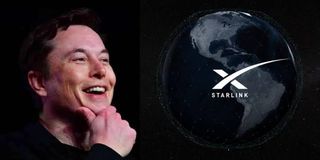Elon Musk's Starlink launched in Kenya

The Starlink photo is seen on a mobile device with a world map. PHOTO | AFP
What you need to know:
- Local internet firm Karibu Connect as its first authorised reseller in Kenya with a promise to offer download speeds of up to 250 Mbps and upload speeds of up to 35 Mbps.
Elon Musk’s satellite internet firm Starlink has operationalised services in the Kenyan market, setting the stage for intensified competition with local players including Safaricom, Jamii Telecommunications Limited and Zuku.
The multinational, an outgrowth of Musk’s space technology firm SpaceX, has further appointed local internet firm Karibu Connect as its first authorised reseller in Kenya with a promise to offer download speeds of up to 250 Mbps and upload speeds of up to 35 Mbps.
A notification displayed on Starlink’s website shows that purchasing a terminal to enable the connections will cost a Kenyan home user Ksh89,000 ($628) in addition to a Ksh3,100 ($21.88) shipping fee while the monthly subscription charge will be Ksh6,500 ($45.89).
For business use, on the other hand, hardware purchase will cost Ksh349,106 ($2,465) plus a shipping charge of Ksh7,500 while the monthly subscription payment has been set at Ksh13,572 ($95.81).
“Starlink is currently available in your area using inter-satellite links. You can expect Starlink’s typical high-speed internet with brief periods of intermittent service and high latency,” states the firm in a web notification.
“Users will be able to engage in common internet activity like email, online shopping or streaming a movie, but they won’t be able to engage in activities like online gaming or video calls. Service will improve dramatically over the next year.”
A Business Daily spot check shows that Starlink’s set pricing sits at the midpoint of what other internet service providers are charging per month.
A bronze fibre package of 8 Mbps speed for home use is, for instance, offered by market leader Safaricom at Ksh2,999 ($21.17) per month while a silver bundle with speeds of 20 Mbps goes for Ksh4,100 ($28.94).
Office-use packages by Safaricom include gold with 40 Mbps speed and diamond with 100 Mbps speed priced at Ksh6,299 ($44.47) and Ksh12,499 ($88.24) respectively.
JTL, on the other hand, offers a 40 Mbps speed package at a monthly fee of Ksh5,250 ($37), 65 Mbps at Ksh10,500 ($74.13), 90 Mbps at Ksh15,750 ($111.19) while 140 Mbps goes for Ksh21,000 ($148.25).
Starlink technology will, however, support services that are not possible with traditional terrestrial communications solutions, allowing unmodified smartphones to connect to satellites in areas with coverage gaps.
The Starlink services will be tailored for both fixed and mobile applications, including vehicle-mounted solutions for use on the go as well as on boats and ships operating both inland and offshore.
No coverage
Safaricom has also lined up plans to offer the satellite internet service in the local market through a partnership with Starlink’s Texas-based rival AST SpaceMobile, which has signed agreements with the telco’s ultimate parent firm Vodafone Group Plc.
Satellite internet connections have the potential to shake up traditional telecoms services which are based on infrastructure that have left many areas without coverage, especially rural parts of the country.





